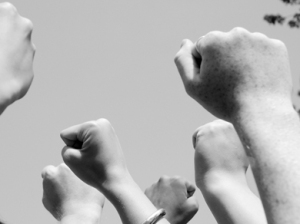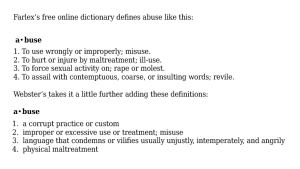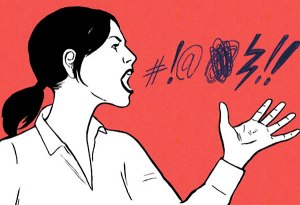
[art by Jacqueline Hudon-Verrelli]
Today’s guest post is from Rachel. “Learning the Words” is a series on the words many of us didn’t have in fundamentalism or conservative evangelicalism– and how we got them back. If you would like to be a part of this series, you can find my contact information at the top.
A boy, about two years old, realized that his parents had left the house. It was a big house, so he wasn’t sure. He ran from room to room sobbing and bellowing out his fear, anger and frustration. I followed him to make sure he was safe, knowing that he wouldn’t be satisfied until he had searched the whole house– he would keep crying with the abandon of a two-year-old until he got tired of it or was distracted. I’d seen it before. His crying didn’t offend me. My frustration was that his parents left without telling him so they could avoid dealing with this scene.
That day an adult who was respected in the Christian community I lived in also watched this scene unfolding. He made a comment about this little boy being “bad.” Although I was just a teenager I challenged this idea. He was just upset. How could that be bad? And the answer was only surprising in that it was applied to this particular situation. It was an argument I was very familiar with: we are all bad. Born with sin. Separated from God and incapable of pleasing Him. In short, on our own, we are worthless. Apparently, even a two-year-old who threw a fit when his needs weren’t met was evidence of this.
It was, I think, a fairly “mainstream” evangelical community, made up of members of a number of different denominations from a number of countries. They were missionaries – people who had fairly extensive training in biblical interpretation and who had committed their lives to reaching the “lost.” Although they tended to share the general evangelical suspicion of secular psychology, they generally had not written it off completely.
But the term “self-esteem” was sometimes criticized. Phrases like “We shouldn’t have self-esteem, we should have God-esteem” rattle around in my memory. When a counselor asked my teenaged self why I had poor self-esteem I was confused. Was there any other kind?
Whenever I hear someone criticize the concept of self-esteem I think: “Everyone has self-esteem. It has to do with our understanding of who we are. It just refers to the idea a person has about what they are worth. Healthy self-esteem is a realistic sense of worth. Unhealthy self-esteem is an unrealistic sense.” It doesn’t mean being proud or having an inflated sense of our abilities.
For a while it seemed pretty simple to me. As Christians, why shouldn’t we have not only a realistic sense of our worth, but even a positive one? After all, God thought that we were valuable enough to die for. He wanted to have a relationship with us. He made us his children. Lists of our identity in Christ just confirmed this idea to me.
But in spite (or because) of this complicated dance of “I no worth on my own but I great worth with God” I realize that I have spent most of my life feeling that I am falling short. Whatever God might think I’m worth, the “me” I deal with every day is still a raging two-year-old demanding to have my needs met. There is still a gray-haired man standing by declaring that I am bad. Maybe if I were healthier, more athletic, less emotional, more organized, or spent more time reading my Bible I would feel more worthy. Maybe I would actually be able to see myself the way that I have been taught that God sees me.
Or is the problem that this is a really muddled way of seeing the self? Do we really know ourselves in relation to how God sees us? Can that really be part of our everyday consciousness? My pastor, a wonderful man, often starts out his sermons saying, “I have nothing worthwhile to say. But I hope that God will speak through me.” This bothers me a little, since he is a man with skills and abilities. I feel that he should take some credit for the work he has done and the thoughts he has assembled.
For some people, maybe it’s all about being filled up and directed by God. But for me I suspect that there’s the spiritual reality I’ve been taught about, and then the physical reality I know from experience. The one where people evaluate me and give me grades. The one where I don’t keep my house clean and last autumn’s leaves are in the process of killing this spring’s grass… But I know that I’m a good cook. That I’m good at having empathy for people. I think I’m good at listening to my children. I desperately want to be good at helping them have a healthy sense of who they are.
So I don’t know what to do with the “We are all worthless sinners without the grace of God” mentality. I guess I start by saying that Jesus died for us before we made the decision, so our worth is not based on whether we get that part right. Because I look at my beautiful baby and I know that he is so much. That even if he never believes right or does right he is worth everything I pour into him. And I hear my five-year-old say “I’m really good at tracing” and I want him to hold on to that satisfaction. I want him to be comfortable with who he is – to feel that he is enough. I want him to know that striving is good, but it doesn’t give us worth. I want them both to know that having needs doesn’t make them bad.
I want self-esteem for my children to be about something other than fighting the sense that at their very core they are worthless sinners. Or even fighting to hold on to the idea that they are loved by God. I want them to have a sense of just themselves. I want them to stretch out in their skins and know that it’s acceptable for them to scream out their rage, to dance out their joys and to rest when they are done playing. I want self-esteem to be about knowing that they have a place in the world that they don’t have to earn. I want them to know they have a value they don’t have to prove.










